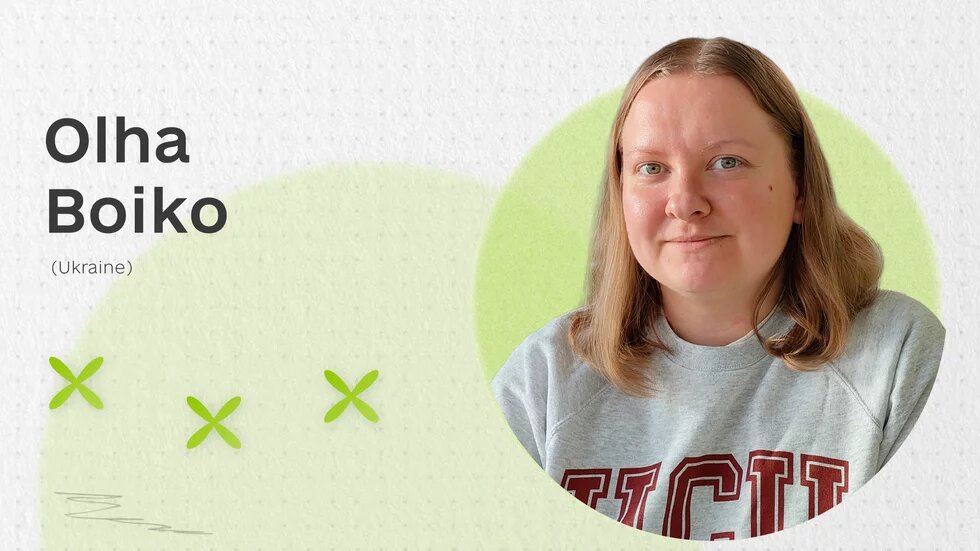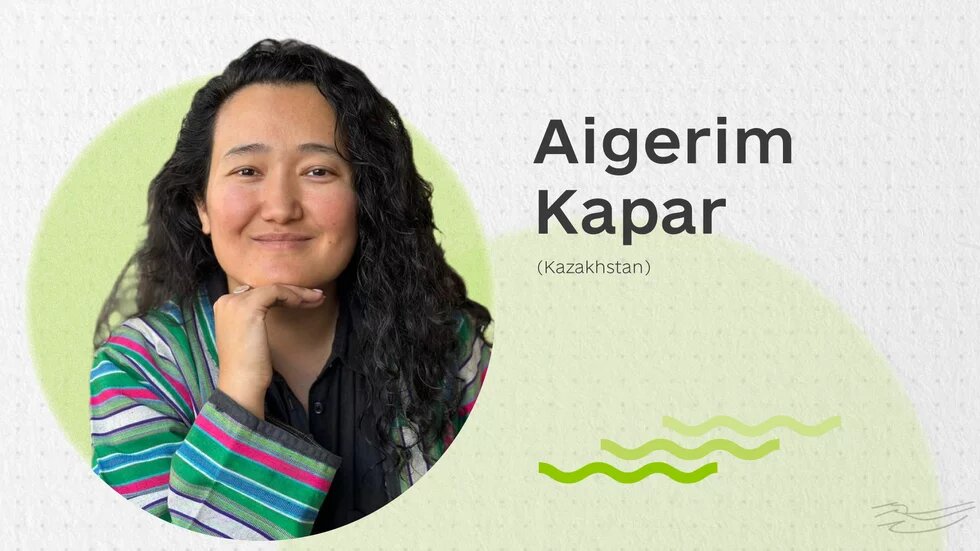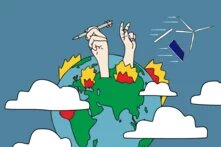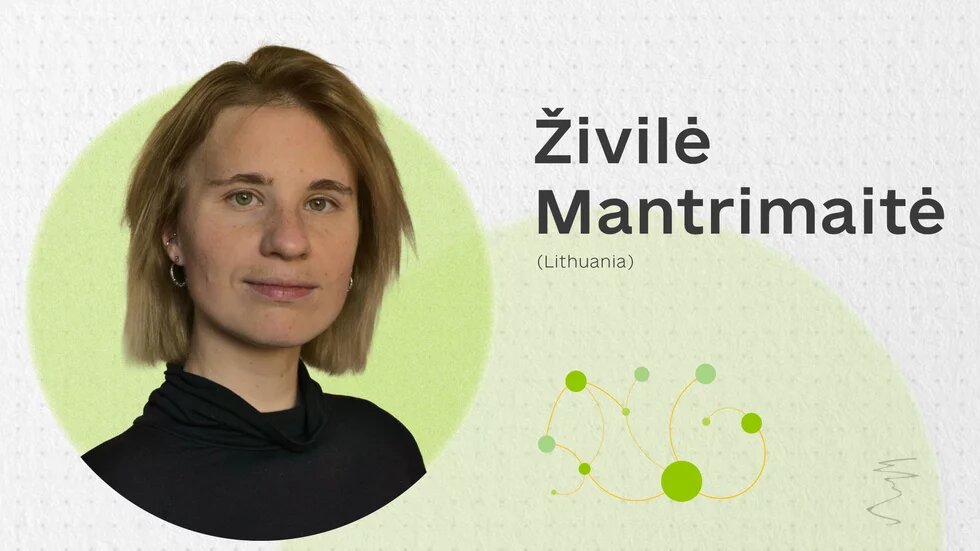
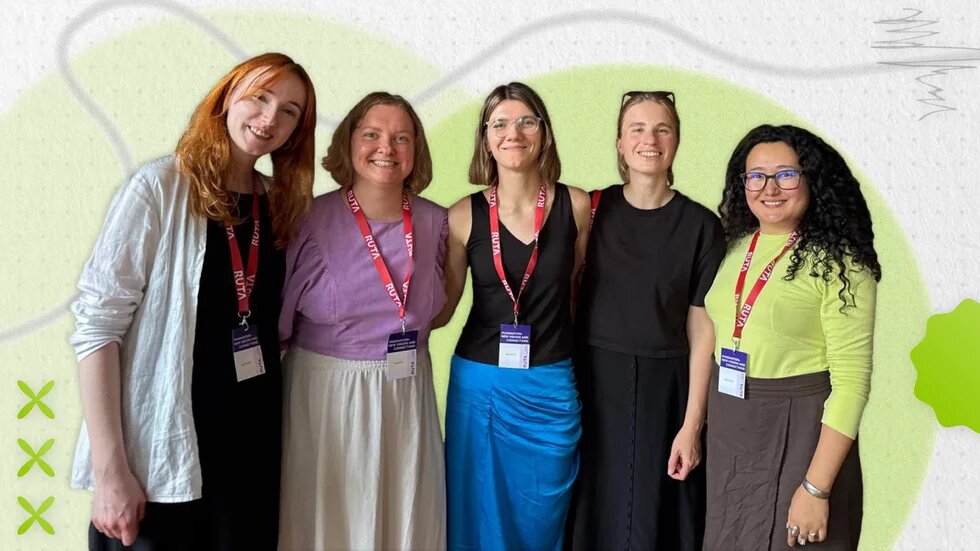
War, colonialism, and climate disasters are tightly interwoven. In our regions, they manifest as echoes of imperial projects on the crossroads of Western capitalism and Soviet/Russian modernity. This piece is based on the findings of the discussion “(Re)imagining Climate Justice and Solidarity in the RUTA regions”, held during RUTA’s 26th annual conference “Imagination: New Visions and Connections” on June 26-29, 2025, in Uzhhorod, Ukraine. The event brought together researchers, artists, and activists from Central and Eastern Europe, the Caucasus, Central and North Asia, and the Baltic States, incentivising them to reimagine those regions as competent actors of decolonization discourse rather than the passive imperial outskirts they were once reduced to.
The panel discussion on climate justice — and this text — emphasised the layered post-colonialism in the region, encompassing both the Soviet imperial legacy and the present-day neo-colonial practices of Russia and the West. In its wake, the Soviet project left a deeply centralized infrastructure, control over resources and the energy sector, populations dispersed through forceful displacement, and a unified environmental policy that ignored the local landscapes and indigenous knowledge. In Lithuania, for instance, this manifested in founding a settlement (the present-day city of Visaginas) to accommodate the needs of the Ignalina Nuclear Power Plant (NPP), built and later decommissioned, with the local community having no say in the matter. Other nations suffered the destruction of entire river systems sacrificed to industrial agriculture or commodity-driven deforestation.
Today, there is an added layer of Western power institutions, specifically exercising their influence through investments and geopolitical agreements. For instance, the recent U.S.-Ukraine Minerals Deal that was concluded without broad public consultations is a disturbing potential example of neocolonial thinking: while transnational companies get the resources, the local people have to pay for those resources with their health and their lives.
As Kazakhstan started public discussions regarding potential wind and hydropower projects, there remains a point of contention in the form of a potential NPP near Lake Balkhash that Rosatom, a Russian state corporation, is planning to build. The public is apprehensive about the potential environmental impact, as well as a lack of transparency, both inherent in a colonial structure, disregarding the well-being of the local communities for its geopolitical or economic interests.
During the panel discussion, the participants were tasked with answering several questions. What does climate justice look like in a region perpetually stuck in the limbo of “transition” from one dominant power to another? How can we picture solidarity stemming not from the global centres of power, but rather from the practices of local communities who are busy defending their land, recovering indigenous knowledge, and working on just energy alternatives right as we speak?
The panel discussion, facilitated under the auspices of the Heinrich Böll Foundation Kyiv — Ukraine, featured several speakers: Maryna Larina (Ukraine), Živilė Mantrimaitė (Lithuania), Aigerim Kapar (Kazakhstan), and Olha Boiko (Ukraine), with Yuliia Kishchuk (Ukraine) as the moderator.
From Monocities to Decentralization: Records of Resistance and Recovery
“It’s not just a matter of energy source, it’s about who owns, controls, and benefits from it,” emphasized Živilė Mantrimaitė, a researcher from Lithuania. In her presentation, she revealed deeply personal and political layers of energy justice, relaying that it was so much bigger than just replacing one type of fuel with another, and that it required rethinking the entire architecture of power institutions.
One of the most striking examples Živilė presented was the city of Visaginas, built in Lithuania to service the Ignalina NPP. Constructed during the Soviet era to supply energy for the Soviet power grid, the power plant, according to the speaker, “doomed the city to be a victim of political thinking scaled for large systems.” After the NPP was decommissioned in 2009 as part of Lithuania's agreement to join the European Union (EU), Visaginas found itself in a deep economic and social crisis, with no support or transition plan.
The centralised electric power systems we inherited from the Soviet era often rob communities of their autonomy, leaving them vulnerable. In her report, Olha Boiko, a climate expert from Ukraine, emphasized that “those systems were designed to serve external power centres. Entire regions underwent forced industrialization, with communities forcefully displaced, their connections to their roots severed. This is so much more than just the energy sector, this is the tale of totalitarian infrastructure.”
Full-scale war in Ukraine revealed just how fragile those systems were: as of mid-2024, Russia had destroyed about 80% of Ukraine’s thermal power generation facilities, cutting off almost by half the power supply necessary for surviving the nation’s winters. In return, communities took ownership of their power supplies, installing solar panels on the roofs of their hospitals, using biomass boilers and heat pumps to heat their schools, and prompting their condo boards to better insulate their apartment buildings. Olha Boiko pointed out that “renewable energy was not just an environmentally friendly solution, it was a means to survival and regaining control.”
That notion resonates with the examples Živilė offered. The initial attempts to create the first energy community in Lithuania faced a severe backlash from governmental institutions and even state-owned enterprises. As a community in western Lithuania learned of plans to build a wind farm without consulting them, they put up resistance. Incredible as it may seem, it was largely perceived as resistance to green transition rather than a stance in defence of the community’s right to have a say in the matter. Although the wind farm was built anyway, the protesters did win some concessions to their demands. Residents of the community receive their share of profits from the electric power generated ever since.
“Energy justice entails more than just the energy per se; it’s about who gets to decide how we live, work, get medical treatment, and move around,” noted Živilė.
It is becoming increasingly obvious — be it Ukraine, Lithuania, or other nations of the region — that no just transition is possible without involving the respective communities. Failing this, we are only perpetuating the dependence driven by outdated structures.
Multilevel Public Solidarity vs. Geopolitical Interests
Other recurring themes in the discussion included developing effective communities, pushback on attempts to force nations into the role of resource colonies, and resisting neo-imperial geopolitical interests. Aigerim Kapar’s presentation focused on the environmental and climate movements campaigning to preserve Lake Balkhash. Aigerim — curator, interdisciplinary researcher, ardent advocate for decolonisation and environment in Kazakhstan, and founder of the contemporary art platform Artcom —initiated the campaign. Her art platform serves as the space for practicing contemporary art and creating communities to preserve local ecosystems in Central Asia. Their major projects include Art Collider, Steppe Space, SOS Taldykol, and Balqashqa Qamqor (Care for Balkhash).
Care for Balkhash is an open initiative designed to preserve the ecosystem of Lake Balkhash, which is currently experiencing serious environmental, social, economic, and climatic challenges due to the detrimental impact of human activities. Lake Balkhash is the fourteenth largest lake in the world, located in Central Kazakhstan. The way its water resources are used is increasingly reminiscent of the human-made ecological catastrophe of the Aral Sea, which occurred in the Anthropocene era. Experts from McKinsey forecast that the lake would lose up to 86% of its waters by 2046 should the existing problems be disregarded, unless conservation efforts gain sufficient attention at the local, national, and regional levels.
Aigerim Kapar emphasized the importance of local communities having substantial influence on decision-making affecting their landscapes and environmental situation. In her presentation, the researcher shared success stories of effective interactions with different levels of government, with the community retaining its key role. In 2024, activists and artists from the Artcom platform organized an international climate forum in the vicinity of Lake Balkhash, bringing together researchers and representatives from the local governments, businesses, and the civic sector. The event led to creating a network of individuals and organizations seeking to protect the lake and promote the region’s sustainable development. That forum also ended up becoming an impetus for promoting legislative, economic, and social solutions to preserve Balkhash.
Maryna Larina is a researcher with expertise in climate and energy policies, focusing on implementing them in the Ukrainian context. In her speech, Maryna presented her findings regarding present-day policies aimed at turning Ukraine into a resource colony, both by external and internal actors, as well as Ukraine’s transition regarding its relations with the EU, USA, and Russia.
The researcher opened her presentation with a list of Ukraine’s major mineral deposits. She believes that the recent U.S.-Ukraine Minerals Deal brought everyone’s attention to the topic that rarely made it into public discussions before. Previously, Ukraine had entered a strategic partnership on raw materials, yet that deal never caused such a public uproar, while the deal with the U.S. incentivised Ukrainians to give some critical thought to their nation’s role in a similar situation. At the same time, Larina emphasized the importance of a critical approach when it comes to Ukraine’s relations with the USA and EU in the context of the green transition and energy policy. Today, Ukraine being promoted as one of the main exporters and transit hubs of green hydrogen (extracted using electricity from renewable sources, like wind or solar power, etc.) leaves one asking important questions, specifically regarding the real beneficiaries. After all, the current narrative and political strategies are mainly focused on exports, echoing the approach predominant in the era of fossil fuels when Ukraine was a mere supplier of raw materials for European economies rather than an independent actor with a potential for the robust and democratic development of its energy sector. That approach would only perpetuate a phenomenon known as “energy colonialism”, with Ukraine (along with the rest of the nations of the Global South) producing hydrogen to mainly serve the interests of wealthy countries, never leaving sufficient added value on the ground.
Apart from that, the researcher emphasized the role played by the local oligarchs who emerged after 1991 and Russia in transforming Ukrainian landscapes into commodities. So far, Russia has been strategically seizing and targeting resource-rich regions of Ukraine that are crucial to the future of the nation’s economy, for the nation’s future economic growth, and for global supply chains of essential materials. For instance, today, 63% of Ukraine’s coal deposits in Donetsk Oblast are under Russia’s temporary military occupation, along with about 50% of Ukraine’s deposits of rare earth elements.
Transportation and consumption of fossil fuels are historically proven contributors to forging economic and political dependencies and increasing Russia’s influence over Ukraine and Europe. Russia has consistently used natural gas as a tool for political pressure and influence. Over the past five decades, Moscow has exploited Europe’s and Ukraine’s dependence on its gas, cutting off supplies at critical times, and orchestrating energy crises and heating shortages, especially during harsh winters. Such actions were often aimed at obtaining political concessions and undue benefits for Russia, as well as exerting Russia’s detrimental influence on both Ukraine and European nations.
Conclusion: When One Thread Snaps, the Rest of Them Hold On
In a day and age when established systems are collapsing, and crises keep adding up, we need long-term decentralized solutions that facilitate cooperation for people from different sectors. We should weave our support networks so tightly that the system is capable of bearing the load and holding the balance even when one of those threads snaps. We don’t need a perfect plan; we need real-world experience. Communities already working together, networks looking out for one another, horizontal ties between people and areas — all of those are links capable of holding on even when institutions fail. Every one of us has to be involved with several of those hands-on communities.
Today, Ukrainians have to be both defensive and open, resilient and flexible, focused and far-sighted, practical and visionary. Being everything at once requires a lot of strength and is exhausting. Therefore, it is crucial to discover communities that allow a person to explore various sides of their personality. Do not despair — do some networking.
For a deeper dive into the topics of climate and decolonization in the region, check out some earlier publications on our website:
